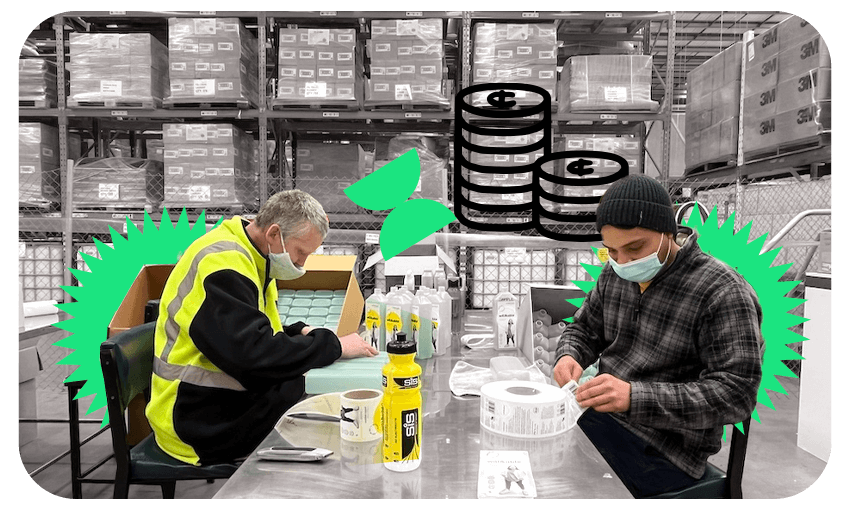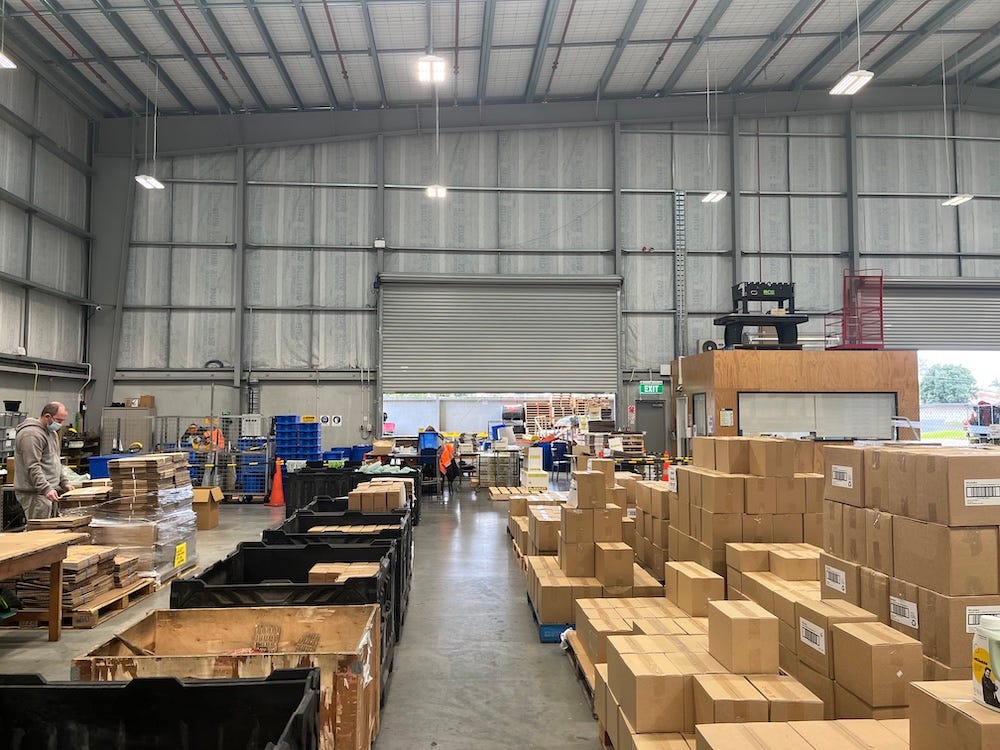Why work means so much to disabled people
Social enterprise Will & Able wants to create 100 jobs for New Zealanders living with disabilities. Three employees share why working matters to them
Kia ora and welcome to Stocktake, created in partnership with Kiwibank.
I’m Reweti Kohere, a staff writer covering business and money at The Spinoff. I’m helming the ship while Chris Schulz enjoys some time off so I hope this week’s Stocktake feels familiar and different.
This week: dignity in the workplace.
-Reweti Kohere, staff writer
Will & Able employees Marcel Coe and Boris Sequeira on site (Photo: Reweti Kohere)
‘We all get a chance’
Inside a factory in the South Auckland suburb of Papatoetoe, there is dignity in working. People clad in hi-vis gear chat to their friends as they fill products with eco-friendly cleaning solutions, strike up some banter as they stick yellow labels on containers and bottles made from 100% recycled milk bottles, and tell jokes as they fulfil online orders. The small team of 10 disabled employees, together with their supervisors and managers, are proud of what they do at Will & Able.
Since 2019, the social enterprise has been providing employment, paid at minimum wage, to New Zealanders living with disabilities and making sustainable dishwashing liquid, laundry detergent, toilet cleaner and other household products. You might have noticed them on Countdown and New World shelves, at The Warehouse, or, if you work at Auckland Council, in its offices, kitchens and cafeterias. Will & Able also encourages customers to return their empties directly or by dropping them off at one of insurance broker Aon’s 70 branches nationwide. The returned product is cleaned, refilled and reused.
People who work at Will & Able might otherwise be unemployed and dependent on benefits. One of its employees, William Paddick, likes knowing he’s earning valuable work experience from his first job. The 19-year-old aspiring diesel mechanic, putting together online orders as I speak with him, says it’s hard for people like him to find a job. “It’s good to have something that gives you a chance. There are not many employers who do.”
Will & Able employee William Paddick assembling online orders (Photo: Reweti Kohere)
Standing next to a pallet of stacked boxes, Boris Sequeira tells me he goes home feeling proud of his efforts, filling his mum in on everything about his day: “the fun we had, the different experiences of what we have done.” Sequeira is perfectly happy where he is. “I got the job after quite a long job hunt. I had a couple of jobs … where I was not myself,” he says. “So I really like being here. I really want to do my best.”
Marcel Coe, Will & Able’s first-ever employee, loves his job. “We all get a chance, and not only that, we get the chance to give our people a chance too,” he says. One of his friends, who lives with Parkinson’s disease, the same brain disorder that world heavyweight champion boxer Muhammad Ali lived with, didn’t know about Will & Able when Coe informed her. “You know what she said to me?” he says, as his eyes start to well up. “‘This [job] gives me a chance at life. There’s almost no other job that would give a chance to me, the way I am, but here’.”
Over one million New Zealanders identify as disabled, and yet about 80,000 of its working population were unemployed in the recent June quarter – double the unemployment rate for non-disabled people at just over 3%, according to Stats NZ. The underutilisation rate of the disabled community is more striking – nearly a quarter of the one million people living with a disability lack a job but are available to work. The statistic is almost two and a half times that of non-disabled people, at 9%.
Inside the social enterprise’s production factory (Photo: Reweti Kohere)
With all the labour shortages that exist in Aotearoa, and which the government is trying to plug with an extra 12,000 working holidaymakers, a potential workforce already exists. And yet as Jonathan Mosen, one of the few disabled chief executives in New Zealand, argues, the country has made normal the “invisibility” of disabled people.
Will & Able general manager Craig Burston has seen firsthand the barriers facing them: his 25-year-old son, Thomas, lives with Asperger’s, which makes it hard for him to relate socially to people. Over Zoom, Burston explains that when disabled people get their first job, their immediate supervisors often have unrealistic expectations of their capabilities. “They think they can work at 100% but they can’t…they never will be, they’re at 70%.” Moreover, workplaces may have the best of intentions in hiring disabled people, but they might lack diversity training within the business.
Workplaces like Will & Able exist as “springboards”, building the disabled community up with skills and confidence to potentially seek jobs in more mainstream workplaces if they want. The social enterprise is striving to employ 100 people so it must produce 10 times the 800,000 units it makes now, and earn 10 times the $2 million it currently does, Burston says. “There’s no shortage of people who could work for us. We’ve just got to really get the ball moving and create positions.”
Coe has had jobs before, but Will & Able is the job for him. “This is the one that gets me up in the morning and saying ‘Yes’. I get happy. I’m happy,” he says. “It’s a blessing – and it can be for so many other people.”
The team at Kiwibank know that business loans can be time consuming to apply for. That’s why they’ve simplified the process. Kiwibank’s simple online loan application, Fast Capital, integrates seamlessly with your accounting software, taking the pain out of the loan process. Find out more here.
Frank, straightforward and confident - Electric Kiwi CEO Luke Blincoe
One of the rounds I covered as a reporter at The NBR was the energy sector, and there was many a time when I interviewed Electric Kiwi’s chief executive, Luke Blincoe. More often than not, his criticisms of the major electricity generator-retailers, or “gentailers”, were the reason I was calling. I found him frank, straightforward and confident – the kind of traits a small, independent power retailer like Electric Kiwi needs in a leader willing to take on the established players. So this profile on Blincoe, by Future Proof’s writer Ellen Rykers, reminds me of his unorthodoxy and wraps up all the things I find fascinating about New Zealand’s electricity sector.
Beyond fossil fuels
Another energy sector recommendation, courtesy of NZ Herald’s Chris Keall who reports (paywalled) New Zealand’s largest private transport company, HW Richardson Group, is making a big hydrogen play with its $15 million hybrid truck and refuelling pilot. Change is inevitable, according to the company’s CEO, Anthony Jones – a sentiment others seem to share, including Meridian and Contact Energy as they investigate a new “green” hydrogen production customer that can consume the electricity Tiwai Point aluminium smelter uses, and First Gas’s plans to eventually supply and distribute hydrogen made from renewable energy. The energy transition is in its early days, and green hydrogen isn’t without its critics. But it’s a sign of progress, to see energy-adjacent sectors like transport are trialling a future beyond fossil fuels.
‘Meat’ from fermented biowaste
Mushrooms are having a media field day. Recently, I profiled Jess Chiang, the chief science officer of biotech startup BioFab, which is commercialising “mushroom packaging” made of the root structures of fungi and agricultural waste. It was a fascinating dive into the “wood wide web” created by mycelia and its potential uses cases, ranging from acoustic panels and floor tiles to mushroom leather hats. Now, NBR’s Dita De Boni reports (paywalled) alternate protein company Off-Piste Provisions has struck a deal with Singaporean researchers to create fake meat from fermented biowaste – a new frontier for the burgeoning food industry.
The finger of blame for high house prices
The “official” economists in Wellington went hunting for the true culprit behind Aotearoa’s house prices and rents being the most expensive in the world. But as Bernard Hickey asks in this week’s episode of When The Facts Change, was the government the biggest culprit all along?
Quick links
Cruise ships are coming back to NZ. But do we really want them?
Understaffing and wellbeing weigh on business.
Don’t lose sleep over a 20% drop in home equity.
Desperately seeking Kelly Smith: Business owner leaves trail of furious customers.
If you love The Spinoff, our newsletters are a great way to stay connected to what we’re about. We publish a range of great newsletters including our daily news digest, The Bulletin, food (The Boil Up) and the environment (Future Proof) as well as our wraps of our best work The Spinoff Daily and The Weekend.
If you liked what you read today, share Stocktake with friends, family and colleagues.













